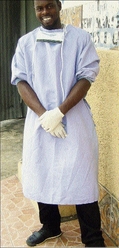Vocationing with the dead
Published: Monday | March 16, 2009


Rohan Parkes - photo by Paul Williams
Rohan Parkes of Rose Lane, west Kingston, is happy to be alive, and to be working with the dead. He's employed at one of the many funeral homes in and around his community, and at age 28 is finding satisfaction in the final care profession.
Yet, in a place where violent deaths are not at all uncommon, he does not see himself and his children remaining for the rest of their lives. But for now, his passport to a better life is taking care of the dead.
Rohan: "Most of the comments (I get) are great, 'the dead look better than the living!' It is bittersweet when yuh know the person. I work on my cousin and my grandfather, my uncle-in-law, whole heap a friends."
Born and bred in of one of Kingston's tough inner-city communities, he did not further his formal education after grade nine at all-age school; his unemployed father, and his mother simply couldn't afford to send him. As such, he could have fallen through the many cracks that surrounded him, but his mother's warnings and scolding always echoed in his head, and they kept him grounded.
Rohan: "Most of mi friends dem in mi teens years died, police shoot dem. No one is too young or too old to die, and growing up inna the ghetto you see the violence and the killing. That's where my mother stand up ... Put har foot pan de grung. She harself woulda rather tek my life, than to see me grow up an a tek people life and a do tings."
Out of a regular job
He got a job as a store clerk in downtown Kingston, and was now supporting his mother and two younger sisters. As time went by, his meagre salary couldn't stretch farther, he was out of a regular job, and expecting his first child, so he went to a funeral home to find work. The operations at the home were not new to him, and he had some interest in them. He was employed to clean the morgue, and then moved up to dressing the dead.
Rohan: "For me, it (cleaning the morgue) never really matter. Any job that mi a do, from mi start fi do it, mi jus put mi mind to it, jus to do it to the best of my ability."
Now, about nine years after, he has learned much, and is still comfortable with his job. A regular day starts about 5 a.m. and ends about noon. His duties include embalming, facial 'reconstruction', applying make-up, grooming of hair, dressing, etc. His biggest challenge is to do as great a job as possible on bodies that are decomposing and/or mangled by bullets or an accident.
When that is done, he feels satisfied as rendering excellent service is integral to his professional philosophy.
After a long morning, he sometimes sticks around for eventualities or be on standby wherever he is.
Final cut
One place in which he can be found is in his barber shop. And his barbering skills are not only applied to the heads of the living. He also cuts the hair of some of his dead male 'clients'. He takes pleasure in giving them a nice final cut. "Trim dem, shave dem, line dem up," he said, as his face lit up with a big smile.
However, while Rohan is happy with what he does for a living, there are some women in his community who refuse to have him touch them, because of his job.
That's all right though, for the mother of his children doesn't have a problem with what he does. After all, he takes care of her and their two children, and he's still accepted in his circle of friends.
As a matter of fact, they take it as a joke sometimes.
Rohan: "For instance, dem woulda say, 'Go round deh soh and go mek dem kill yuh, Rohan deh yah fi fix yuh!'"
But in a region where there are many social problems, much crime and violence, he has had his own brush with death.
In March, last year, while at his friend's barber shop, along Slipe Road, for the friend's birthday get-together, a gunman opened fire on them. The friend was sprayed with bullets all over, and died instantly. Rohan, who has seen much bloodshed in his short life, was now in the line of fire himself. It was a most horrifying moment.
Rohan: "That was a great day, because a check seh that was when my life would end. I didn't know that a got shot, but when a running and a drop, a hold up my head and a say, "Father God, a really here so mi a come dead lef mi youth dem ... It was scary ... When the shot start fire at first, I was so shock, I even stand up a look pon the gun before I even move off, first two shots come outta the gun mi nuh move yet, cyaah move ... ."
Rohan was hospitalised for just a few days. Luckily the bullet that hit him exited his torso. The incident was to contribute to his most poignant moment on the job, because he was given the task of preparing his friend of many years for the transition.
He was keen on making him look good for many reasons, but more so because he believes he too would have been dead, if the friend had not got into the path of the bullets.
'Creating a vibes'
"It was a holiday ... Mi come up here, mi alone in the parlour working. Mi come with mi liquor and wet him up, smoke round him and chat to him ... Just creating a vibes, mi and him alone ... Mi tell him say mi ago work pon him, embalm him right yah now ... Work pon him same way ... Try to work pon him as best as I can ... Whole heap a shot, face shot, head shot, body shot ... heartbreaking."
Processing the deceased is not a job for a weakling and those suffering from 'queasy-stomach syndrome', yet it is an alternative to unemployment and suffering, and so Rohan's advice to the youth on the fringe is: "Him affi just mek up him mind, and know say a livity him a deal wid. Anything yuh affi do fi make a living, yuh affi put yuh mind to it ... Yuh cyaan pree wha people or woman a say ... Yuh give them any money now dem will tek it. Dem nah goh tell yuh say a dead money."
paul.williams@gleanerjm.com








